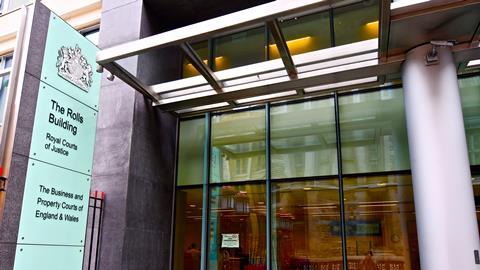A solicitor accused of negligence by clients who changed their minds over a mediation settlement in fact acted competently, the High Court has ruled in a long-running litigation over a businessman's bankruptcy. Even if negligence had been shown, the failure to show it caused any loss would have been fatal to the claim, His Honour Judge Paul Matthews ruled in Sandra Blower v GH Canfields LLP.
The ruling followed a week-long hearing in which London firm Canfields was accused of acting negligently in mediation with the trustee in bankruptcy of John Blower, a former car salesman and amateur boxer who became a successful businessman now resident in Spain. The court heard that Blower ran into financial difficulties over a loan to buy a Hawker 800 corporate jet in 2007, just before the 'credit crunch'. He was adjudged bankrupt in 2014.
Later that year, the trustee in bankruptcy issued proceedings involving assets worth £2 million owned by the Blower family, for which Canfields acted. Following a 12-hour mediation meeting, attended by Blower and solictor Robert Whitehouse, the trustee agreed to accept £1.5 million in settlement of all claims and to allow Blower's immediate discharge from bankruptcy. The settlement was secured partially by charges on properties.
However six days later, Blower called Whitehouse to say he wanted to renege on the agreement as family members said they had not agreed to a charge on a property. In 2020 new solicitors acting for his wife Sandra issued a claim against GH Canfields for negligence.
Ruling on the negligence claim, the judge found the terms agreed in the mediation had been negotiated by Blower himself, whose family trusted to reach the best terms possible, along with Whitehouse. The solicitor, whom the judge described as 'a clear and straightforward witness with a highly professional manner' had been careful to advise Blower not to enter the mediated agreement if he had any doubt about his ability to raise the finance.
'In my judgment his advice in this respect was not negligent,' the judge continued. 'The reasonably competent litigation solicitor would have advised settlement on terms similar to those actually achieved. He was also not negligent in taking Mr Blower’s instructions as those of his clients.'
The 35-page judgment includes 12 paragraphs of explanation 'for the benefit of the lay parties in this case' of how judicial decisions are reached. Noting that 'judges do not possess supernatural powers' it states that they 'decide cases on the basis of the material and arguments put before them by the parties'. The judge noted that, depending on circumstances, adverse inference may be drawn from the absence of a witness.
He accepted GH Canfields' submission that he draw such inference from the claimant's failure to call Blower as a witness.
Simon Myerson KC and Jonathan McNae, instructed by McFaddens LLP appeared for Sandra Blower; Jonathan Seitler KC and Lemuel Lucan-Wiklson, instructed by Womble Bond Dickinson, for GH Canfields LLP.
This article is now closed for comment.




























4 Readers' comments